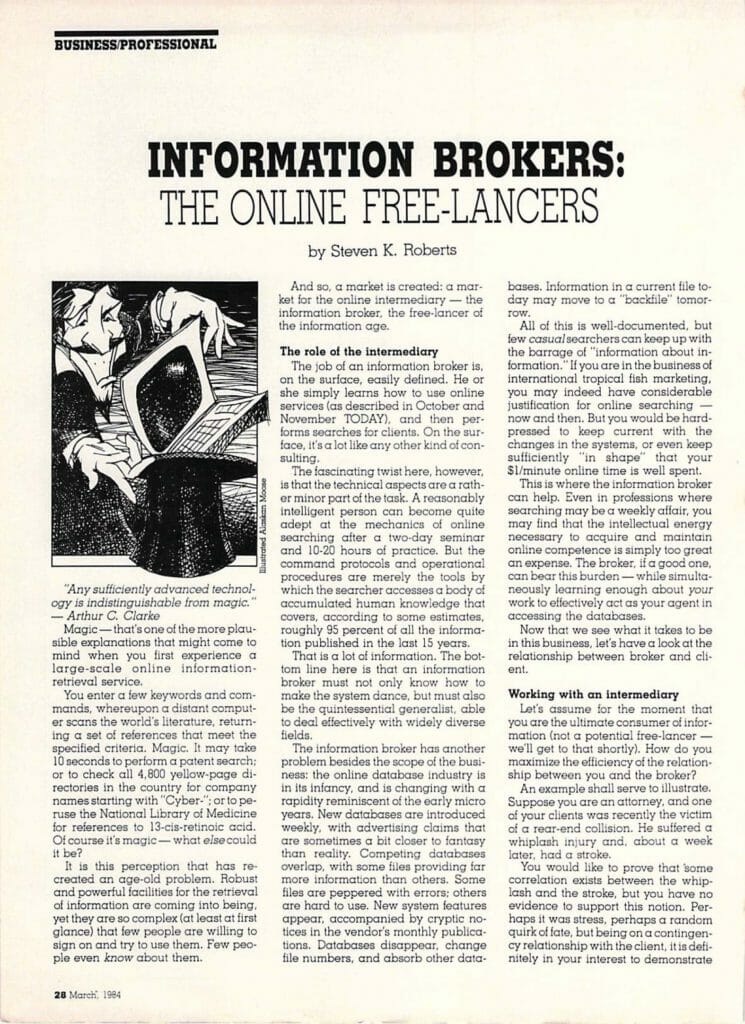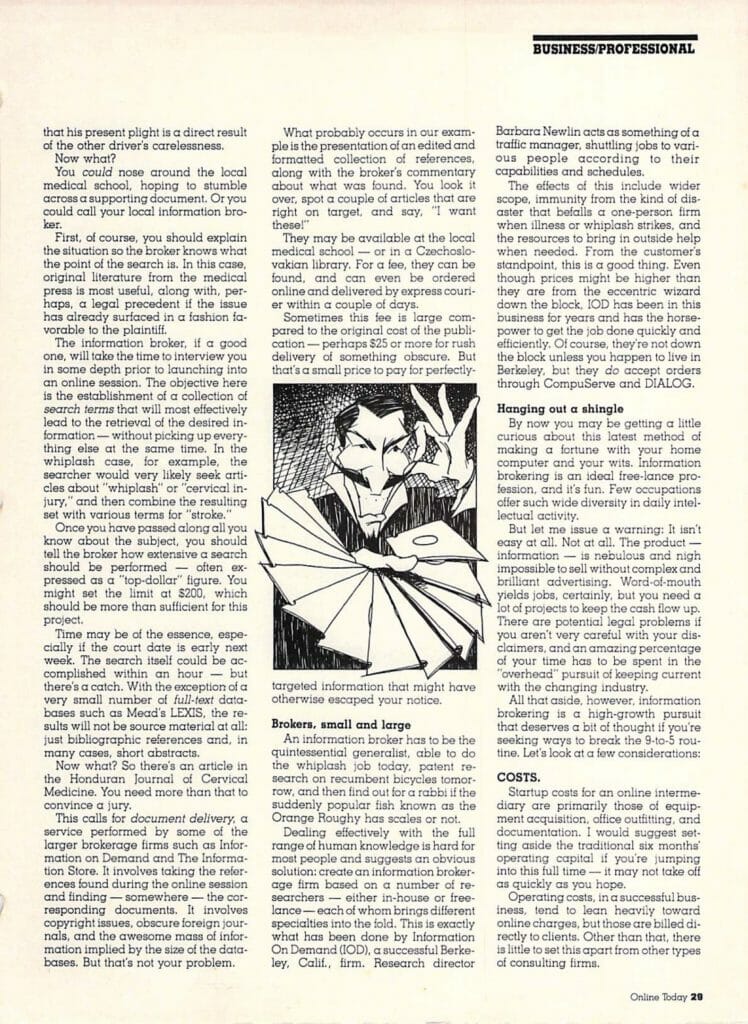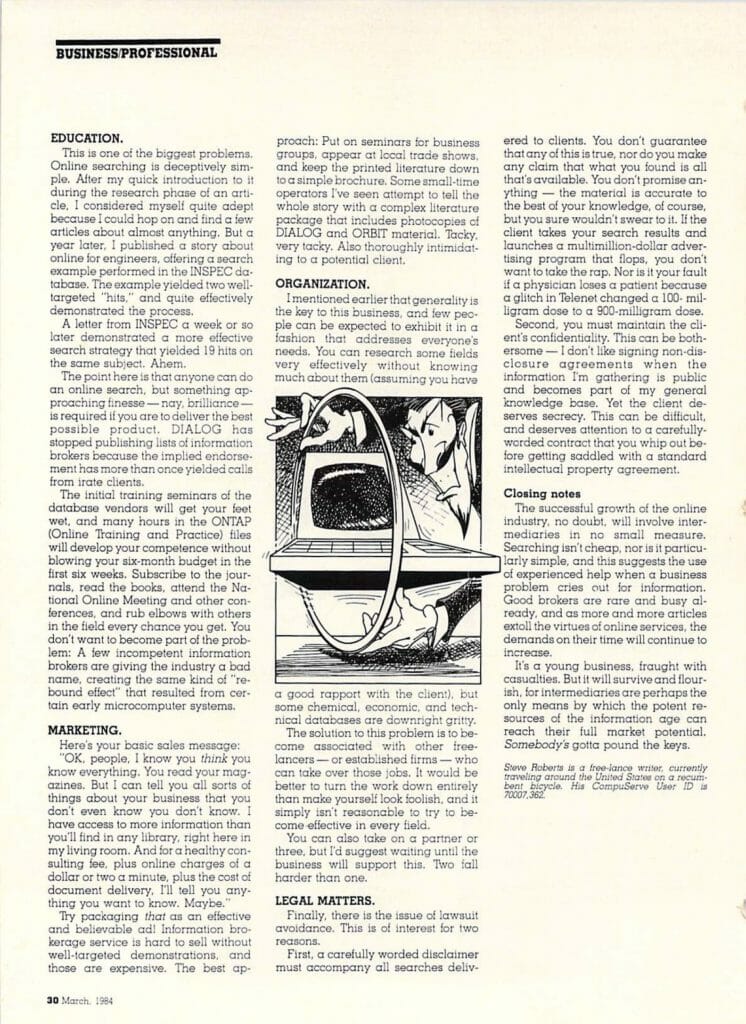
Information Brokers: The Online Freelancers
Written while I was on the road, this piece discusses information brokers who leverage their knowledge of Dialog and other database services into consulting work. I had done a bit of that myself (as The Information Institute), but that was a minor sideline compared to writing and preparing for the Computing Across America adventure. I had friends who were raking it in, however, and this piece for Online Today (CompuServe) explained how to work with an intermediary… and how to become one.
How different things are now, decades later! Let me just Google that…
by Steven K. Roberts
Online Today
March, 1984
“Any sufficiently advanced technology is indistinguishable from magic.” — Arthur C. Clarke
Magic — that’s one of the more plausible explanations that might come to mind when you first experience a large-scale online information-retrieval service.
You enter a few keywords and commands, whereupon a distant computer scans the world’s literature, returning a set of references that meet the specified criteria. Magic. It may take 10 seconds to perform a patent search; or to check all 4,800 yellow-page directories in the country for company names starting with “Cyber-“; or to peruse the National Library of Medicine for references to 13-cis-retinoic acid. Of course it’s magic — what else could it be?
It is this perception that has re created an age-old problem. Robust and powerful facilities for the retrieval of information are coming into being, yet they are so complex (at least at first glance) that few people are willing to sign on and try to use them. Few people even know about them.
And so, a market is created: a market for the online intermediary — the information broker, the free-lancer of the information age.
The role of the intermediary
The job of an information broker is, on the surface, easily defined. He or she simply learns how to use online services (as described in October and November TODAY), and then performs searches for clients. On the surface, it’s a lot like any other kind of consulting.
The fascinating twist here, however, is that the technical aspects are a rather minor part of the task. A reasonably intelligent person can become quite adept at the mechanics of online searching after a two-day seminar and 10-20 hours of practice. But the command protocols and operational procedures are merely the tools by which the searcher accesses a body of accumulated human knowledge that covers, according to some estimates, roughly 95 percent of all the information published in the last 15 years.
That is a lot of information. The bottom line here is that an information broker must not only know how to make the system dance, but must also be the quintessential generalist, able to deal effectively with widely diverse fields.
The broker has another problem besides the scope of the business: the online database industry is in its infancy, and is changing with a rapidity reminiscent of the early micro years. New databases are introduced weekly, with advertising claims that are sometimes a bit closer to fantasy than reality. Competing databases overlap, with some files providing far more information than others. Some are peppered with errors; others are hard to use. New system features appear, accompanied by cryptic notices in the vendor’s monthly publications. Databases disappear, change file numbers, and absorb other databases. Information in a current file today may move to a “backfile” tomorrow.
All of this is well-documented, but few casual searchers can keep up with the barrage of “information about information.” If you are in the business of international tropical fish marketing, you may indeed have considerable justification for online searching — now and then. But you would be hard-pressed to keep current with the changes in the systems, or even keep sufficiently “in shape” that your $1/minute online time is well spent.
This is where the information broker can help. Even in professions where searching may be a weekly affair, you may find that the intellectual energy necessary to acquire and maintain online competence is simply too great an expense. The broker, if a good one, can bear this burden — while simultaneously learning enough about your work to effectively act as your agent in accessing the databases.
Now that we see what it takes to be in this business, let’s have a look at the relationship between broker and client.
Working with an intermediary
Let’s assume for the moment that you are the ultimate consumer of information (not a potential free-lancer — we’ll get to that shortly). How do you maximize the efficiency of the relationship between you and the broker?
An example shall serve to illustrate. Suppose you are an attorney, and one of your clients was recently the victim of a rear-end collision. He suffered a whiplash injury and, about a week later, had a stroke.
You would like to prove that some correlation exists between the whiplash and the stroke, but you have no evidence to support this notion. Perhaps it was stress, perhaps a random quirk of fate, but being on a contingency relationship with the client, it is definitely in your interest to demonstrate that his present plight is a direct result of the other driver’s carelessness.
Now what?
You could nose around the local medical school, hoping to stumble across a supporting document. Or you could call your local information broker.
First, of course, you should explain the situation so the broker knows what the point of the search is. In this case, original literature from the medical press is most useful, along with, perhaps, a legal precedent if the issue has already surfaced in a fashion favorable to the plaintiff.
The information broker, if a good one, will take the time to interview you in some depth prior to launching into an online session. The objective here is the establishment of a collection of search terms that will most effectively lead to the retrieval of the desired information — without picking up every thing else at the same time. In the whiplash case, for example, the searcher would very likely seek articles about “whiplash” or “cervical injury,” and then combine the resulting set with various terms for “stroke.”
Once you have passed along all you know about the subject, you should tell the broker how extensive a search should be performed — often expressed as a “top-dollar” figure. You might set the limit at $200, which should be more than sufficient for this project.
Time may be of the essence, especially if the court date is early next week. The search itself could be accomplished within an hour — but there’s a catch. With the exception of a very small number of full-text databases such as Mead’s LEXIS, the results will not be source material at all: just bibliographic references and, in many cases, short abstracts.
Now what? So there’s an article in the Honduran Journal of Cervical Medicine. You need more than that to convince a jury.
This calls for document delivery, a service performed by some of the larger brokerage firms such as Information on Demand and The Information Store. It involves taking the references found during the online session and finding — somewhere — the corresponding documents. It involves copyright issues, obscure foreign journals, and the awesome mass of information implied by the size of the databases. But that’s not your problem.
What probably occurs in our example is the presentation of an edited and formatted collection of references, along with the broker’s commentary about what was found. You look it over, spot a couple of articles that are right on target, and say, “I want these!”
They may be available at the local medical school — or in a Czechoslovakian library. For a fee, they can be found, and can even be ordered online and delivered by express courier within a couple of days.
Sometimes this fee is large compared to the original cost of the publication — perhaps $25 or more for rush delivery of something obscure. But that’s a small price to pay for perfectly-targeted information that might have otherwise escaped your notice.
Brokers, small and large
An information broker has to be the quintessential generalist, able to do the whiplash job today, patent research on recumbent bicycles tomorrow, and then find out for a rabbi if the suddenly popular fish known as the Orange Roughy has scales or not.
Dealing effectively with the full range of human knowledge is hard for most people and suggests an obvious solution: create an information brokerage firm based on a number of researchers — either in-house or freelance — each of whom brings different specialties into the fold. This is exactly what has been done by Information On Demand (IOD), a successful Berkeley, Calif., firm. Research director Barbara Newlin acts as something of a traffic manager, shuttling jobs to various people according to their capabilities and schedules.
The effects of this include wider scope, immunity from the kind of disaster that befalls a one-person firm when illness or whiplash strikes, and the resources to bring in outside help when needed. From the customer’s standpoint, this is a good thing. Even though prices might be higher than they are from the eccentric wizard down the block, IOD has been in this business for years and has the horsepower to get the job done quickly and efficiently. Of course, they’re not down the block unless you happen to live in Berkeley, but they do accept orders through CompuServe and DIALOG.
Hanging out a shingle
By now you may be getting a little curious about this latest method of making a fortune with your home computer and your wits. Information brokering is an ideal free-lance profession, and it’s fun. Few occupations offer such wide diversity in daily intellectual activity.
But let me issue a warning: It isn’t easy at all. Not at all. The product — information — is nebulous and nigh impossible to sell without complex and brilliant advertising. Word-of-mouth yields jobs, certainly, but you need a lot of projects to keep the cash flow up. There are potential legal problems if you aren’t very careful with your disclaimers, and an amazing percentage of your time has to be spent in the “overhead” pursuit of keeping current with the changing industry.
All that aside, however, information brokering is a high-growth pursuit that deserves a bit of thought if you’re seeking ways to break the 9-to-5 routine. Let’s look at a few considerations:
COSTS.
Startup costs for an online intermediary are primarily those of equipment acquisition, office outfitting, and documentation. I would suggest setting aside the traditional six months’ operating capital if you’re jumping into this full time — it may not take off as quickly as you hope.
Operating costs, in a successful business, tend to lean heavily toward online charges, but those are billed directly to clients. Other than that, there is little to set this apart from other types of consulting firms.
EDUCATION
This is one of the biggest problems. Online searching is deceptively simple. After my quick introduction to it during the research phase of an article, I considered myself quite adept because I could hop on and find a few articles about almost anything. But a year later, I published a story about online for engineers, offering a search example performed in the INSPEC database. The example yielded two well-targeted “hits,” and quite effectively demonstrated the process.
A letter from INSPEC a week or so later demonstrated a more effective search strategy that yielded 19 hits on the same subject. Ahem. The point here is that anyone can do an online search, but something approaching finesse — nay, brilliance — is required if you are to deliver the best possible product. DIALOG has stopped publishing lists of information brokers because the implied endorsement has more than once yielded calls from irate clients.
The initial training seminars of the database vendors will get your feet wet, and many hours in the ONTAP (Online Training and Practice) files will develop your competence without blowing your six-month budget in the first six weeks. Subscribe to the journals, read the books, attend the National Online Meeting and other conferences, and rub elbows with others in the field every chance you get. You don’t want to become part of the problem: A few incompetent information brokers are giving the industry a bad name, creating the same kind of “rebound effect” that resulted from certain early microcomputer systems.
MARKETING
Here’s your basic sales message:
“OK, people, I know you think you know everything. You read your magazines. But I can tell you all sorts of things about your business that you don’t even know you don’t know. I have access to more information than you’ll find in any library, right here in my living room. And for a healthy consulting fee, plus online charges of a dollar or two a minute, plus the cost of document delivery, I’ll tell you anything you want to know. Maybe.”
Try packaging that as an effective and believable ad! Information brokerage service is hard to sell without well-targeted demonstrations, and these are expensive. The best approach: Put on seminars for business groups, appear at local trade shows, and keep the printed literature down to a simple brochure. Some small-time operators I’ve seen attempt to tell the whole story with a complex literature package that includes photocopies of DIALOG and ORBIT material. Tacky, very tacky. Also thoroughly intimidating to a potential client.
ORGANIZATION
I mentioned earlier that generality is the key to this business, and few people can be expected to exhibit it in a fashion that addresses everyone’s needs. You can research some fields very effectively without knowing much about them (assuming you have a good rapport with the client), but some chemical, economic, and technical databases are downright gritty.
The solution to this problem is to become associated with other freelancers — or established firms — who can take over those jobs. It would be better to turn the work down entirely than make yourself look foolish, and it simply isn’t reasonable to try to become effective in every field.
You can also take on a partner or three, but I’d suggest waiting until the business will support this. Two fall harder than one.
LEGAL MATTERS
Finally, there is the issue of lawsuit avoidance. This is of interest for two reasons.
First, a carefully worded disclaimer must accompany all searches delivered to clients. You don’t guarantee that any of this is true, nor do you make any claim that what you found is all that’s available. You don’t promise anything — the material is accurate to the best of your knowledge, of course, but you sure wouldn’t swear to it. If the client takes your search results and launches a multimillion-dollar advertising program that flops, you don’t want to take the rap. Nor is it your fault if a physician loses a patient because a glitch in Telenet changed a 100-milligram dose to a 900-milligram dose.
Second, you must maintain the client’s confidentiality. This can be bothersome — I don’t like signing non-disclosure agreements when the information I’m gathering is public and becomes part of my general knowledge base. Yet the client deserves secrecy. This can be difficult, and deserves attention to a carefully-worded contract that you whip out before getting saddled with a standard intellectual property agreement.
Closing notes
The successful growth of the online industry, no doubt, will involve intermediaries in no small measure. Searching isn’t cheap, nor is it particularly simple, and this suggests the use of experienced help when a business problem cries out for information. Good brokers are rare and busy already, and as more and more articles extoll the virtues of online services, the demands on their time will continue to increase.
It’s a young business, fraught with casualties. But it will survive and flourish, for intermediaries are perhaps the only means by which the potent resources of the information age can reach their full market potential. Somebody’s gotta pound the keys.
Steve Roberts is a free-lance writer, currently traveling around the Untied States on a recumbent bicycle. His CompuServe User ID is 70007.362.





You must be logged in to post a comment.